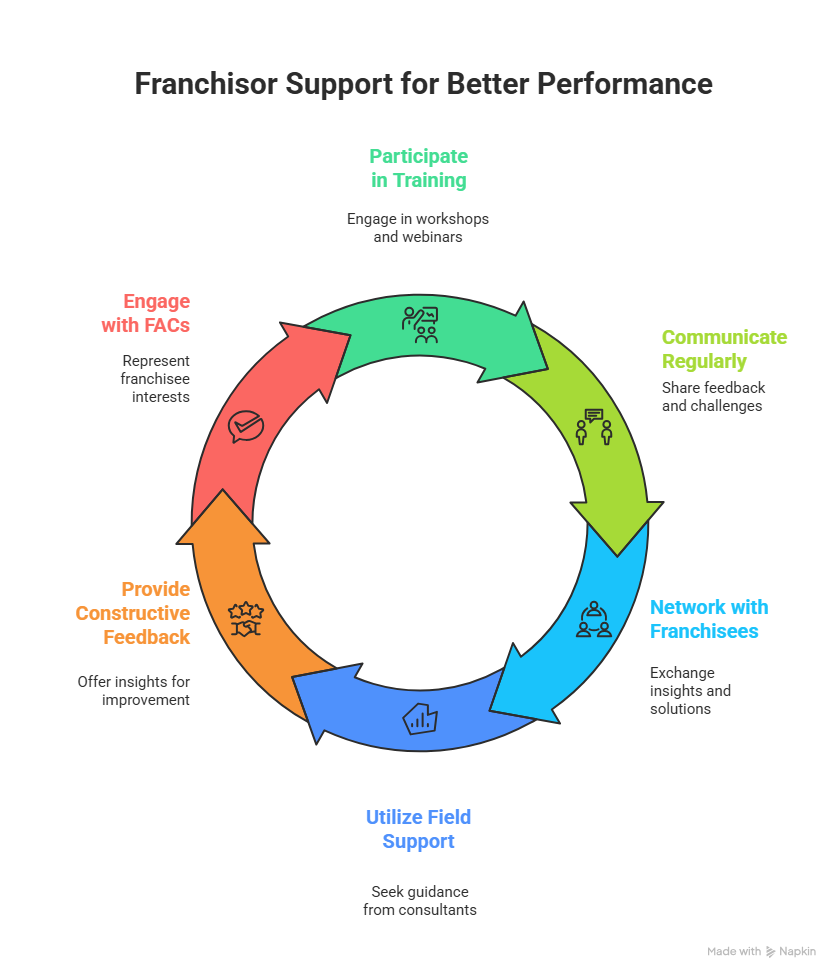
Thinking of starting a franchise business? In 2025, the franchise model in India is booming — but not all franchises are created equal, and “plug-and-play” success is a myth. With over 300 new brands launching every year, franchise ownership remains one of the most accessible paths to entrepreneurship, if you choose and run it wisely.
A strong brand name and blueprint help, but your success will depend on making smart, informed decisions at every step: from selection and legal review to day-to-day execution and scaling.
This guide breaks down what really drives franchise success in India today. Whether you’re eyeing your first outlet or planning to build a multi-unit business, these insights will help you avoid rookie mistakes, maximize returns, and build something sustainable.
At its core, a franchise is a business-in-a-box. You (the franchisee) get the legal right to operate under an existing brand’s name, using their proven systems, products, and processes. In exchange, you typically pay an initial franchise fee and recurring royalties.
It’s not ownership in the traditional sense — it’s a licensing agreement. You benefit from the franchisor’s reputation, standard operating procedures (SOPs), and support, but you’re also expected to adhere to brand guidelines and operational protocols.
It’s this balance — structure with independence that makes franchising appealing for many first-time entrepreneurs.
For many aspiring business owners, franchising offers a less risky path to entrepreneurship. Here's why it works:
Example: Cloud kitchen franchises like Kouzina offer a ready-made operational framework across multiple virtual brands (like WarmOven and Indiana Burgers). With low upfront investment and no dine-in space needed, it’s a plug-and-scale option for food entrepreneurs looking to tap into India’s growing online delivery demand.
Thorough research is the cornerstone of a successful franchise. Skipping this crucial phase can lead to costly mistakes. Dedicate ample time to investigating opportunities diligently.
Before examining specific franchises, take a moment to understand yourself.
What are your skills, interests, and financial capabilities?
What kind of work environment do you prefer?
Do you enjoy customer interaction or prefer behind-the-scenes operations?
Aligning your personal goals with the franchise type is critical. This self-awareness will guide you toward suitable options.
Investigate industries that genuinely interest you. Research market trends, growth potential, and competitive areas. Is the industry growing or declining? Are there significant disruptions on the horizon?
A thriving industry provides a more stable foundation for your business. Look for sectors with consistent consumer demand.
This step is arguably the most important. Scrutinize every aspect of the franchisor. Examine their financial stability, their track record, and their support systems.
A financially sound franchisor can better support your business. Look for strong, consistent performance across their existing units.
The FDD is a legal document that every franchisor is required to provide to prospective franchisees. It contains 23 key pieces of information about the franchise system.
Read every section carefully, especially Item 19 (Financial Performance Representations) and Item 20 (List of Franchisees).
This document offers a comprehensive overview of the franchise opportunity. It reveals potential risks and rewards transparently.
This step provides invaluable firsthand insights. Contact as many current and former franchisees as possible.
Ask them about their experiences with the franchisor's support. Inquire about the training, marketing assistance, and profitability.
Their perspectives offer an unfiltered view of daily operations. Understand both their successes and their challenges.
Do not sign any agreements without professional advice. Hire an attorney specializing in franchise law. They can review the FDD and the franchise agreement. They will explain your legal obligations and rights clearly.
A financial advisor can assess the franchisor's financial statements. They can also help you develop a realistic business plan.
Also read: Starting a Food Business Franchise Opportunity in India
Choosing the right franchise is paramount. It involves more than just liking a brand. It requires strategic thinking and careful evaluation of long-term viability.

Operating a franchise requires a significant amount of time and energy. Choose a business you genuinely care about. Your passion will sustain you through challenges.
Ensure the franchisor's values align with your own. This alignment fosters a more fulfilling and ethical business experience.
A successful franchise typically has a straightforward and repeatable business model. Is the concept easy to understand and implement?
Can it be scaled for future growth? Complexity can lead to operational inefficiencies. Simplicity allows for easier training and consistent execution.
Thorough training is crucial, especially for new franchisees. What kind of initial training does the franchisor provide? Is there ongoing support, such as field visits or online resources?
Strong support systems help you navigate operational challenges. They are essential for long-term success and adaptation.
Franchisors collect marketing fees. Understand how these funds are utilized. Is there a cohesive national marketing strategy?
How do local marketing efforts integrate with national campaigns?
Effective marketing drives customer traffic to your location. Ensure the advertising fund is managed transparently and effectively.
The franchise agreement is a linking legal contract. It outlines the rights & responsibilities of both parties. Pay close attention to the terms of the agreement, renewal options, and termination clauses.
Understand royalty fees, advertising fees, and any other ongoing costs. A clear understanding prevents future disputes.
Does the franchise agreement grant you an exclusive territory? Or will other franchisees operate nearby?
Exclusive territories can prevent cannibalization of sales. Understand the franchisor's policies on territory expansion. A clearly defined territory protects your market share.
Kouzina streamlines franchise development by providing entrepreneurs with ready-to-deploy cloud kitchen setups and established brand portfolios, such as Indiana Burgers, Kaati Zone, and Warm Oven. This model lowers entry barriers, enabling swift market penetration.
Once you have selected and secured your franchise, focus shifts to operations. Efficient and effective daily management is vital for profitability and growth.

The primary benefit of a franchise is its proven system. Follow the franchisor's operational guidelines precisely. This includes branding standards, service protocols, and product specifications.
Consistency builds brand recognition and customer trust. Deviating from the system can jeopardize your success.
Treat the franchisor's training seriously. Absorb all information regarding operations, marketing, and customer service.
Apply the knowledge gained from training in your daily activities. Effective training ensures you are well-prepared for all aspects of the business. It is your foundation for success.
Your employees are the face of your business. Recruit individuals who align with the brand's values and ethos. Provide thorough training and foster a positive work environment.
Empower your team members and recognize their contributions. A motivated team consistently delivers excellent customer service.
Exceptional customer service is a differentiator. Train your staff to be friendly, efficient, and problem-solvers.
Respond promptly to customer feedback, both positive and negative. Satisfied customers become loyal patrons. Word-of-mouth referrals are invaluable for growth.
Maintain meticulous financial records from day one. Monitor cash flow, expenses, and revenues closely to ensure accurate financial management and control. Understand your break-even point and profit margins.
Utilize financial planning tools and consult with your financial advisor regularly. Prudent financial management ensures long-term viability.
Most modern franchises integrate various technologies. Utilize point-of-sale systems, inventory management software, and customer relationship management (CRM) tools.
Go for online ordering platforms and digital marketing tools to enhance your business. Technology can streamline operations and enhance customer experience.
While part of a national brand, your franchise operates locally. Research local demographics, competitor activities, and community events.
Tailor local marketing efforts to resonate with your immediate customer base. Becoming an active part of your community builds local loyalty.
Utilize the franchisor's national marketing campaigns. Supplement these with targeted local marketing initiatives. Use social media, local advertisements, and community sponsorships.
A consistent and multi-channel marketing approach drives customer acquisition and retention. Track the effectiveness of your campaigns.
Consistency in product or service quality is important. Regularly inspect your operations to ensure adherence to brand standards.
Conduct periodic quality checks and address any deviations promptly. Maintaining high quality builds customer trust and protects the brand's reputation.
Must read: Starting and Running a Franchise Restaurant: What is It and How Does It Work?
One of the greatest advantages of a franchise is the ongoing support. Knowing how to use this support can be a game-changer for your business.

Franchisors often provide ongoing training, workshops, and webinars to support their franchisees. These resources keep you updated on new products, services, and operational improvements.
Participate actively to gain new insights and network with other franchisees. Continuous learning is essential for adaptation.
Maintain open lines of communication with your franchisor. Share your successes, challenges, and feedback. Utilize their designated support channels. Proactive communication helps the franchisor understand your needs. It allows them to provide timely assistance.
Connect with fellow franchisees within the system. Share best practices, challenges, and solutions. Peer insights can be invaluable for problem-solving.
This network provides a supportive community. It can offer practical advice and emotional support.
Many franchisors offer field support from regional consultants. Take advantage of their visits and expertise. They can provide operational guidance, identify areas for improvement, and offer strategic advice. View them as partners in your success.
Your operational experience offers valuable insights for the franchisor. Provide constructive feedback on systems, products, and support. This helps the franchisor improve the overall franchise system. A collaborative relationship benefits everyone.
Some franchisors have Franchisee Advisory Councils. These councils represent the interests of franchisees. Participating or communicating with FACs ensures your voice is heard. They are a formal channel for collective feedback and suggestions.
Read also: Ultimate Guide to Franchise Marketing: Definition, Types, & Strategies
The business landscape is dynamic. Be prepared to adapt and plan for future growth. Flexibility and foresight are crucial for long-term success.
Achieving success in a franchise business requires a multifaceted approach. It starts with a thorough self-assessment and meticulous research. Strategic selection of the right franchisor and a deep understanding of their system are crucial.
Once operational, focus on consistent execution, exceptional customer service, and prudent financial management. Actively use the support offered by your franchisor and adapt to market changes.
You will significantly improve your chances of making a successful franchise by adhering to these franchise business tips.
Looking to enter the foodservice industry with a proven, tech-driven model? Kouzina offers strong brand recognition, scalable support, and low upfront investment, making it the perfect opportunity for entrepreneurs. Start your journey today and tap into the booming food delivery market!